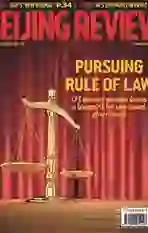Time to Restore Order to Hong Kong
2014-11-10ByLanXinzhen
By+Lan+Xinzhen
In a long-awaited move, government officials from the Hong Kong Special Administrative Region (SAR) held talks on October 21 with representatives of the Hong Kong Federation of Students, one of the major organizers behind the areas “Occupy Central” movement. Such a move represents the Hong Kong SAR Governments intention to reach an agreement with the “Occupy Central” movement in a peaceful way and restore order to the SAR.
The “Occupy Central” movement, a protest group that was first formed in March 2013 but has seen a number of resurgences since, has caused the disruption of key thoroughfares in Hong Kong and affected surrounding businesses and residences over recent months. A large student protest that started in late September even forced the closure of some schools. As a consequence, downtown Hong Kong has been partially paralyzed by the large-scale protests.
The movements actions over the last weeks have negatively affected the livelihoods of many in Hong Kong, over which China resumed the exercise of sovereignty in 1997. At that time, the Central Government promised that the chief executive of Hong Kong would be elected by local citizens. However, as the region had been under British colonial rule for the past more than 100 years and lacked experience with democratic traditions, the Central Government put in place a transitional period working toward universal suffrage beginning in 2017.
After Hong Kong Chief Executive Leung Chun-ying delivered a report on Hong Kongs constitutional development to the Standing Committee of the National Peoples Congress (NPC), Chinas top legislature, on August 31, the committee announced its plans regarding the selection of candidates for the chief executive position. Two or three candidates put forth by a “broadly representative” nomination committee would be approved to run for office, and the 5 million-plus eligible Hong Kong voters would enjoy universal suffrage in choosing the winner—”one man, one vote.” The nomination committee, which will be made up of members across all social strata and professions, will guarantee democracy in Hong Kong.
Detractors claim, however, that Beijings involvement in the process will undermine the brand of universal suffrage promised during the territorys 1997 handover. They have expressed dissatisfaction with the NPC Standing Committees decided-upon framework, demanding instead that all candidates for the SARs highest office should be selected by“public nomination.”
Some suspect, however, that behind the participants of the “Occupy Central”campaign hide the real culprits—external forces who want to put Hong Kong into chaos.
Chief Executive Leung said he would consider disclosing the evidence of external interference “at an appropriate time” on October 21. Many in Hong Kong and on the Chinese mainland believe that the British and U.S. governments and their officials are funding and supporting the movement.
It would be in the interests of the British Government to indirectly control Hong Kong by helping select its chief executive. This has now been made impossible by the NPC Standing Committee-approved
election method, as those who oppose the Chinese Government cannot be nominated as candidates. Therefore external forces wishing to exert their influence on Hong Kong have resorted to supporting activists such as Benny Tai Yiuting, a professor of law from Hong Kong University, who initially proposed the public nomination of candidates and founded the“Occupy Central” movement.
The United States is another supporter of the protests. Tony Cartalucci, a researcher with the U.S. geopolitical think tank Land Destroyer, noted that Benny Tai Yiu-ting has attended multiple forums and activities held in Hong Kong by the National Endowment for Democracy and the National Democratic Institute, which are both under the administration of the U.S. Department of State.
The Chinese Government has long been wary of foreign countries interference in Hong Kongs affairs. A white paper on the practice of “one country, two systems” in Hong Kong issued by the State Council Information Office on June 10 stated that China should stay alert to external forces seeking to meddle with the countrys internal affairs by manipulating events in Hong Kong.
Furthermore, the “Occupy Central”movement seems to elicit increasing dissatisfaction from Hong Kong citizens. All in all, the campaign—which hails itself as peaceful—has harmed commerce, the economy and peoples daily lives in the name of bettering all of these areas. This movement would do well to come to its natural end, sooner rather than later.
